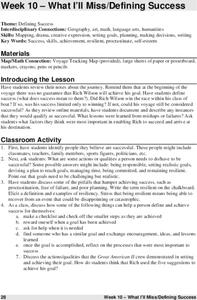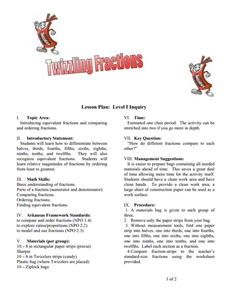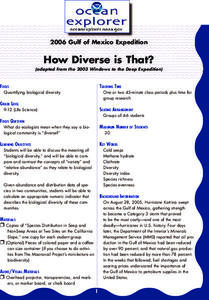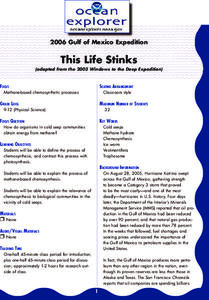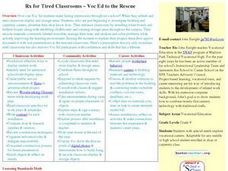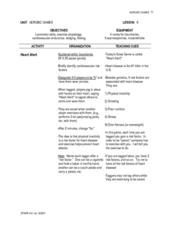US Institute of Peace
Nonverbal Communication
What is your body saying that maybe your words aren't? Scholars explore the vast world of the subtle, and not-so-subtle, nonverbal communication cues through group and individual work. Lesson seven in a series of peacebuilding exercises...
US Institute of Peace
Identifying Your Conflict Style
How do you handle conflict? Individuals look inward to determine their own conflict style through group discussion and a short quiz. The sixth installment in a series of 15 conflict management lessons examines how our feelings and...
University of California
Anti-Communism at Home
Have you ever been accused of something without cause? The sixth installment of an eight-part series asks scholars to create a museum exhibit on the anti-communist activities in the United States at the start of the Cold War. To make...
Facts and Files
The Nile
While it may not be possible to take an entire class to Egypt and explore the ancient wonders, it is possible to engage your young historians in activities that ask them to research these and other antiquities and place them on their...
Federal Reserve Bank
The Story of the Federal Reserve: High School Lesson Plan
Is there a bank for the banks? Pupils analyze the complexities of the Federal Reserve system by breaking it down into easy-to-understand sections. Step-by-step investigation using flow charts and graphs of how the monetary system works...
Jamestown-Yorktown Foundation
How Did Relations between Britain and the Colonies Change after the French and Indian War?
What does the French and Indian War have to do with the American Revolution? Following the war, Britain issued the Proclamation of 1763 in an attempt to limit the colonists' western expansion. To understand how the proclamation, the...
Curated OER
Recycling Survey
How many people really recycle recyclables and how do they feel about it? High schoolers create a survey to find out. Once they agree on what questions to include, they each interview four people outside of the classroom. They combine...
Curated OER
Defining Success
The class defines what it means to be successful by examining the achievements of Rich Wilson. They create headlines for a mock paper, discuss achieving personal goals, and create a scrapbook of his journey. Tip: Use this resource when...
University of Arkansas
Twizzling Fractions
Using food as a manipulative is one of the best ways to incorporate hands-on learning in the classroom. This hands-on approach allows young mathematicians to compare, order, and identify fractions with the use of Twizzlers® and fraction...
Curated OER
Writing Skills: Fables
Use fables as a fun way for English Language Learners to gain confidence and fluency in their reading and speaking skills. After reading a fable in class, they retell their story to a group of their peers. When this jigsaw activity is...
Curated OER
Soccer - Lesson 18 - 1st Round of the World Cup
Lesson 18 in this 20 lesson soccer unit is really just the 1st round of the World Cup class soccer tournament. This is not really a lesson, but is inserted into the unit as a place holder for the days activity. All the players are busy...
Curated OER
Life is Weird
Separate your science class into small groups and assign each a specific deep-sea organism to research. The class will learn about all of the organisms as each group presents their assigned animal. Following their presentations, you can...
Curated OER
How Diverse is That?
After reviewing biodiversity, learners work in small groups to analyze actual species distribution data. They learn to calculate the Shannon-Weaver diversity index for different communities. Though not particularly engaging, the content...
Curated OER
CSI on the Deep Reef
After some instruction, small groups prepare a written report on chemotrophic organisms. Though not clearly mentioned, this resource would work best if groups have the Internet available to research the vocabulary and different organisms...
Curated OER
This Life Stinks
Chemosynthetic communities of cold seep areas are considered in this lesson. Working in collaborative groups, marine biology or oceanography learners research and prepare a report about oxidation-reduction reactions involved with...
Curated OER
Rx for Tired Classrooms: Vocational Ed to the Rescue
Secondary carpenters apply their skills to improve display spaces in classrooms at their campus. Includes a contract between workers and teachers who sign on for improvements in the their rooms. Concurrent exploration of building and...
Curated OER
Heart Alert
Explore some of the causes and preventions of heart disease. Young learners play a game of tag in which the taggers role play as risk factors for heart disease. Players who are tagged call out "heart alert" and are saved when someone...
Curated OER
Emotions for ESL Students
You might get emotional during this activity - but don't worry, that's the idea! The class practices analyzing emotions, including their own, their peers' facial expressions, and colors and sounds that remind them of certain emotions....
Alabama Department of Archives and History
Alabama Slave Codes in 1833: What They Can Teach Us About Slaves Themselves
After viewing a short PowerPoint about Nat Turner's rebellion, class groups examine Alabama's 1833 slave codes. Individuals then develop a mini-legal brief arguing against one particular slave law.
Curated OER
Can You Count on Cans?
How can a canned food drive be connected to math? It's as simple as counting and organizing the cans! Children demonstrate their ability to sort non-perishable foods into categories that include soup cans, vegetable cans, boxed items,...
Nemours KidsHealth
Asthma: Grades 3-5
Young scholars discuss the health effects of asthma. In this asthma instructional activity, students answer questions about their own history with asthma or difficulty breathing. They create a pamphlet to go in a doctor's office to...
Curated OER
Socialist and Market Economies in Tanzania
How did Tanzania transition from a socialist to a market economic system? This challenging group research project has scholars examining the change through these structural adjustment policies: trade liberalization, privatization, cost...
Other popular searches
- Time Management Skills
- Time Management Games
- Time Management Activity
- Teaching Time Management
- Time Management Lessons
- Management Time Study Skills
- Time Management Lesson Plans
- Time Management Case Study
- Time Management Daily Agenda
- Time Management in Science
- Time Management Dialy Agenda
- Time Management System









